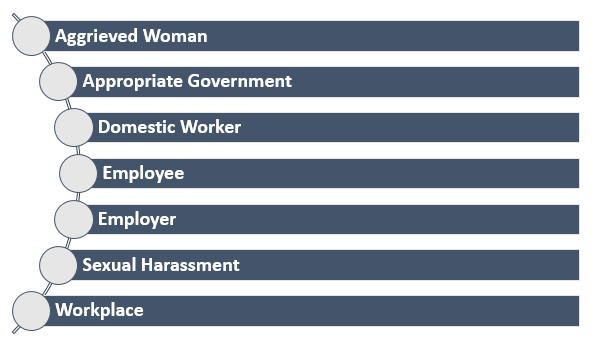
Definitions and Terminologies– Section 2 of the Act defines, inter alia, the important terms used in the Act. These definitions and terminologies are applicable unless the context requires otherwise.
Aggrieved Woman
As per Sec2(a), the word has been used to describe working women of any age who is employed in a workplace or a dwelling place or house and are harassed sexually. In the case of the workplace, even if she is not employed by that particular workplace.
Appropriate Government
As per Sec2(b), Appropriate Government means :
(i) In relation to a workplace which is established, owned, controlled or wholly or substantially financed by funds provided directly or indirectly by the Central Government or the Union territory administration, the Central Government will be the appropriate Government by the State Government, the State Government will be the appropriate Government.
(ii) In relation to any workplace not covered under sub-clause (i) and falling within its territory, the State Government will be the appropriate Government.
Thus, the appropriate Government is the Central or State Government or the Union Territory Administration as per Section 2(b) of the Act.
Domestic Worker
As we looking on Definitions and Terminologies, so here it is- As per Section 2(e), the Domestic worker means-
A woman who is employed to do the household work in any household for remuneration whether in cash or kind, either directly or through any agency on a temporary, permanent, part-time, or full-time basis; but does not include any member of the family of the employer.
Thus, the domestic workers would include any maidservant part-time, full time, temporary or permanent employed directly or through any agency other than any member of the employer’s family who received remuneration whether in cash or kind for the purpose of this Act.
Employee
The term ‘employee’ as defined under section 2(f) means :
(i) Any person employed at a workplace for any work on a regular, temporary, ad hoc, or daily wage basis, either directly or through an agent, including a contractor,
(ii) An employee kept with or without knowledge of the principal employer, whether for remuneration or not,
(iii) Even a person working on a voluntary basis or otherwise,
(iv) Whether the terms of employment are express or implied and
(v) Includes a co-worker, a contract worker, probationer, trainee, apprentice or called by any other such name.
Thus, the definition of employee has a very wide amplitude. The aim of the legislature appears to extend the applicability to almost every possible employee at the workplace irrespective of the terminology, terms, and conditions of employment or remuneration.

Employer
The employer as per Sec2(g) is :
(i) The head or any person responsible for the management, supervision, and control of the workplace;
(ii) Officer appointed by the appropriate Government or the local authority;
(iii) The person discharging contractual obligations with respect to the employees;
(iv) In the case of a household, the person who employs or is benefitted by employment.
Sexual Harassment
The definition of the term Sexual Harassment as provided by Section 2(n) is an inclusive definition. It says Sexual Harassment includes any one or more of the following unwelcome acts or behavior (whether directly or by implication) namely –
(i) Physical contact and advances; or
(ii) A demand or request for sexual favors; or
(iii) Making sexually colored remarks; or
(iv) Showing pornography; or
(v) Any other unwelcome physical, verbal or non-verbal conduct of sexual nature.
The definition is in line with the Supreme Court’s definition in Vishaka Judgment. The advantage of the inclusive definition is that any other type or kind not covered here may be included whenever circumstances arise demands.
Workplace
The definition of workplace is inclusive. Section 2(o) states that work includes the following:
(i) Any department, organization, undertaking, establishment, enterprise, institution, office, branch or unit which is established, owned, controlled or wholly or substantially financed by funds provided directly or indirectly by the appropriate Government or the local authority or a Government company or a corporation or a co-operative society;
(ii) Any private sector organization or a private venture, undertaking, enterprise, institution, establishment, society, trust, non-governmental organization, unit or service provider carrying on commercial, professional, vocational, educational, entertain mental, industrial, health services or financial activities including production, supply, sale, distribution or service;
(iii) Hospital or nursing homes;
(iv) Any sports institute, stadium, sports complex or competition or games venue, whether residential or not used for training, sports, or other activities relating thereto;
(v) Any place visited by the employee arising out of employment including transportation provided by the employer for undertaking such a journey;
(vi) A dwelling place or a house.
Unorganized Sector
The Act in Section 2(p) defines an unorganized sector in relation to a workplace as an enterprise owned by individuals or self-employed workers and engaged in the production or sale of goods or providing service of any kind whatsoever and where the enterprise employs workers, the number of such workers is less than 10.
Learn the Definitions and Terminologies and try the free practice test! Click the image below!


